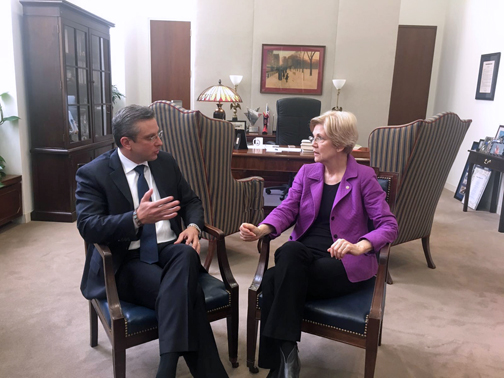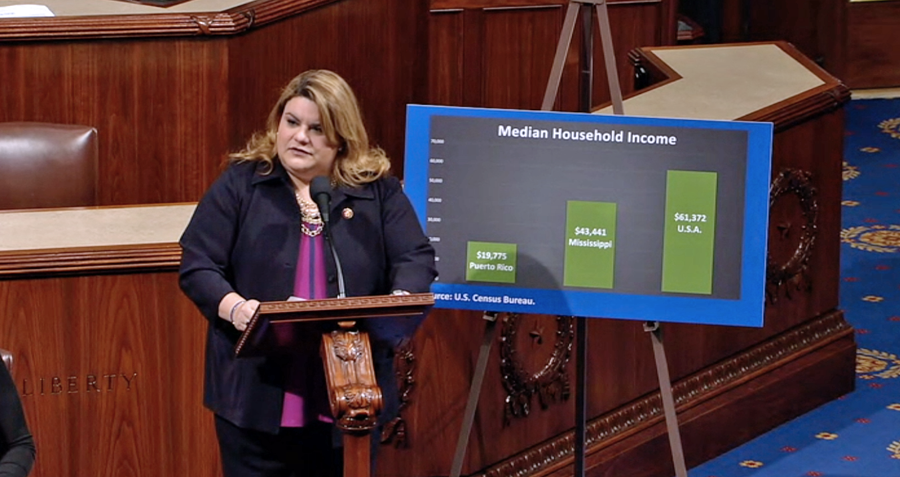Lobbying for, against PROMESA heats up in U.S. Senate

Lobbying efforts both for and against the approval of the Puerto Rico Oversight, Management and Economic Stability Act (PROMESA) bill at the Senate gained steam in Washington Thursday, with public- and private-sector representatives making their case with U.S. Senators.
On the one hand, a broad coalition of prominent Puerto Rican civil society leaders and organizations, representing all sides of the ideological and political spectrum, issued an open letter to U.S. Senators calling on them to the PROMESA bill, H.R. 5278, which passed the U.S. House of Representatives several weeks ago.
The coalition denounced PROMESA saying “it revokes the Puerto Rican people’s basic, fundamental right to democratic self-governance, by imposing a federally-appointed “oversight board” composed of unelected Washington bureaucrats to govern the island without any accountability nor the consent of the governed.”
The coalition criticized efforts by Senate leadership to pass the bill on a cloture vote without properly having a thorough debate and the possibility to introduce amendments.
The coalition includes national organizations and leaders such as the Latino Partnership for Conservative Principles, the National Puerto Rican Coalition (NPRC), the National Hispanic Caucus of State Legislators and Lifetime Achievement Grammy Award winner Willie Colón.
In the letter, the group said: “the PROMESA bill revokes the Puerto Rican people’s basic, fundamental right to democratic self-governance, by imposing a federally-appointed ‘oversight board’ composed of unelected Washington bureaucrats to govern the island without any accountability nor the consent of the governed.”
“As reflected by several polls, the majority of Puerto Ricans oppose PROMESA. In fact, for most PROMESA represents a setback to the island’s democratic developments. Unfortunately, the White House and Congressional leaders are not in tune with the political reality of the island,” the letter stated.
“It is bad enough that Congress would trample on the basic rights of its people. That Congress would circumvent the democratic process and to do so at the behest of the White House and Congressional leaders — thus depriving lawmakers of the chance to amend the bill in any way that might improve it — is profoundly un-American,” the group said.

From left: Antonio Weiss, Counselor to the U.S. Secretary of the Treasury, and Resident Commissioner Pedro Pierluisi during the panel discussion.
García-Padilla, Pierluisi defend bill
Meanwhile, Gov. Alejandro García-Padilla and Puerto Rico Resident Commissioner Pedro Pierluisi defended the measure, which they said albeit not perfect, would help put the island back on track.
During a forum organized by the Center for American Progress Action Fund, “Puerto Rico in Crisis: Will Congress Provide Relief?,” García-Padilla warned that if the federal government fails to give Puerto Rico the necessary tools to solve its debt crisis before July 1, 2016 — when a $2 billion debt service payment is due — the government will be unable to provide essential services to the 3.5 million Americans on the island.
“Even though we have reduced governmental spending since we took office, we have been forced to default on certain note payments since last August. The same thing will happen with the upcoming payment due July 1,” García-Padilla said.
“As I have repeatedly told our creditors, federal officials and the Puerto Rican people, we do not have money to pay. Our toolbox is empty. After my government has done all it could, the moment has arrived for the Senate to act and approve PROMESA immediately,” he said.
The governor, who sent a letter urging 100 U.S. Senators to pass the bill, spent Thursday meeting with lawmakers on both sides of the political aisles, including Democrat Sen. Elizabeth Warren.
“The future of Puerto Rico is hanging from a thread,” García Padilla continued. “While our creditors continue to sue the Commonwealth with the intention of collecting their balances, 45 percent of the Puerto Rican people live under the poverty level. There is no alternative to this measure,” García-Padilla said.
Although the governor has said this bill is far from perfect, it brings Puerto Rico what it urgently needs: the ability to completely restructure its public debt and stay litigation from creditors.
Pierluisi, meanwhile, said the “overwhelmingly bipartisan” bill passed in the U.S. House is vital for Puerto Rico.
“The government of Puerto Rico is about to collapse. It lost all access to financial markets a year and a half ago. July is the first month of the fiscal year, and Puerto Rico has no access to markets,” he said. “You also have a government that owes more than $2 billion to contractors and private sector suppliers. This is a government that is not helping growth.”
Also, he said the government itself, due to this fiscal crisis, is basically a huge counterparty risk for any private capital looking to invest, for example in the island’s energy sector.
“We would love for a private company to come and sign a contract to operate a plant for energy at a lower cost, but who will do that when the government is about to collapse?” Pierluisi said.
“What makes this legislation does is help the government of Puerto Rico restore its financial health and regain access to markets,” Pierluisi said.
Pierluisi also said the opposition to the bill “is based on erroneous information, based on earlier drafts, based on pure semantics.” He said two issues that have generated controversy are the clause that would authorize the government of Puerto Rico to allow certain young workers to receive less than the federal minimum wage — $4.25 instead of $7.25 an hour — and pensions.
As for the first, both Pierluisi and García-Padilla said the impact of the clause is “meaningless” because the governor would have to opt-in to pay younger workers less.
“No candidate for governor is in favor of it; no governor will opt to extend the time that young workers will be paid $4.25 an hour. The Puerto Rico legislature may also increase the minimum wage to young workers from $4.25 to $7.25. There is nothing to prevent it,” Pierluisi said. “They are turning this issue as a kind of ‘message,’ but it is irrelevant, it will not happen.”
Regarding the pensions issue, Pierluisi said the bill was the product of lengthy negotiations among the U.S. House, the White House and U.S. Treasury, and “it is not perfect, but is the result of bipartisan negotiations. There is language in the bill that requires that Puerto Rico’s fiscal plan provide adequate for the payment of pensions,” said Pierluisi.
Currently, the bill is under the consideration of the U.S. Senate and is expected to go for avote next week, prior to July 1.














